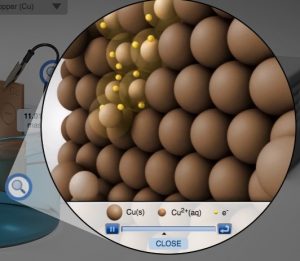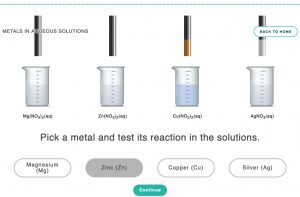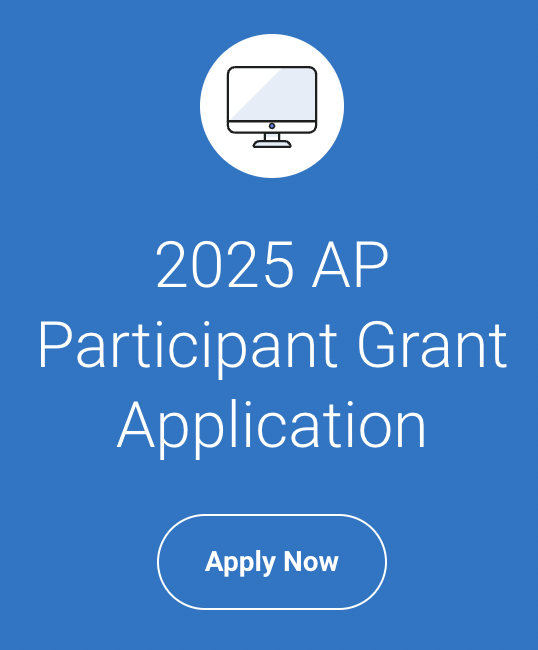AP Chemistry Course Description
 The summer institute will discuss topics important for the current AP chemistry experience: a) provide insight into changes in the new AP Chemistry curriculum, b) introduce the new on-line quizzes and test bank, c) introduce the new improved learning objectives and science practices, d) discuss and demonstrate how inquiry can be used in the AP Chemistry classroom and laboratory to help students understand fundamental chemistry concepts, and e) analyze the 2022 AP Chemistry Exam.
The summer institute will discuss topics important for the current AP chemistry experience: a) provide insight into changes in the new AP Chemistry curriculum, b) introduce the new on-line quizzes and test bank, c) introduce the new improved learning objectives and science practices, d) discuss and demonstrate how inquiry can be used in the AP Chemistry classroom and laboratory to help students understand fundamental chemistry concepts, and e) analyze the 2022 AP Chemistry Exam.
Starting in May, 2019 the College Board provided a new Course and Exam Description (CED). The CED will contain chemistry content separated into nine Units, LOs associated with specific Essential Knowledge statements, Science Practices/Skills that are closely connected with the content units and a smaller set of Big Ideas that connect all the concepts in the course. This APSI will discuss the newest AP Classroom along with all of the new resources available to AP teachers and students. AP Chemistry teachers, know much of the content to be taught, however, teachers may not be familiar with the depth and breadth of the content being assessed on the AP Chemistry Exam. Additionally, teachers may want suggestions and guidance on how to move students who earned a 1 or a 2 on the AP Chemistry Exam towards a 3, how to move 3’s to 4’s and 4’s to 5’s. We will provide sample activities that may provide a different approach to teaching topics. All of the resources that teachers will use, and many others, will be available at no additional cost through an AP Chemistry website developed by Professor John Gelder, Oklahoma State University, and former AP Chemistry Chief Reader.
 Professor John Gelder continues to serve as a Table Leader or Question Leader at the AP Chemistry Reading during the previous three years (2019, 2020, 2021). Based on his 20 years experience with the leadership of the AP Chemistry Exam, he will share his in-sights on how teachers could approach content that has proved to be difficult. These topics include:
Professor John Gelder continues to serve as a Table Leader or Question Leader at the AP Chemistry Reading during the previous three years (2019, 2020, 2021). Based on his 20 years experience with the leadership of the AP Chemistry Exam, he will share his in-sights on how teachers could approach content that has proved to be difficult. These topics include:
- Periodicity and Atomic Structure
- Bonding and Molecular Structure
- Reactions
- Intermolecular Attractive Forces
- Thermodynamics
- Gas Phase and Aqueous Equilibrium
- Chemical Kinetics
- Electrochemistry
 In laboratory there will be a mixture of hands-on experiments and particulate level computer-based experiments to further support the topics listed above. Many of the more difficult problems that have appeared on recent AP Chemistry Exams, along with prevalent student misconceptions, will be discussed.
In laboratory there will be a mixture of hands-on experiments and particulate level computer-based experiments to further support the topics listed above. Many of the more difficult problems that have appeared on recent AP Chemistry Exams, along with prevalent student misconceptions, will be discussed.
Teachers will experience learning chemistry via guided-inquiry activities for both classroom and laboratory components of the course. During the hands-on portion of the workshop, teachers will have access to graphing calculators and probe-ware for data collections and analysis. Teachers will use these activities to help acquire a more fundamental understanding of the topics listed above and then build modules incorporating inquiry into their classroom.
 Please see this link to a computer simulation on electrochemistry (by Gelder and Greenbowe with Pearson Publishing) as one of the unique tools we have developed to help teach chemistry.
Please see this link to a computer simulation on electrochemistry (by Gelder and Greenbowe with Pearson Publishing) as one of the unique tools we have developed to help teach chemistry.
Chemistry experiments will be selected from the recommended experiments listed in in the CED, and many will utilize an inquiry format. Laboratory experiments/activities will include the following topics: equilibrium, thermodynamics, kinetics and electrochemistry.
Prior to the APSI participating teachers will be asked to access a web site, to provide input into the content that should be discussed, and to complete a number of online activities. These explorations will provide important prior knowledge to help determine the content to be covered in the APSI. The address of the web site will be e-mailed to the participants at least two weeks before the APSI. (Please be sure the e-mail that you provide is one you will check throughout the summer.) Participants will have access to an APSI web site that includes homework assignments (with answers), sample examinations (with answers) and additional activities that can be incorporated into the classroom.
What to Bring?: Goggles, clothing and foot-wear appropriate for working in the laboratory, graphing calculator, portable computer (if you have one, or you have access to a school computer), your AP Chemistry course syllabus, favorite activities that you use in your classroom that you would like to share, favorite website addresses, U-tube video links or other resources that you find useful in your classroom.


